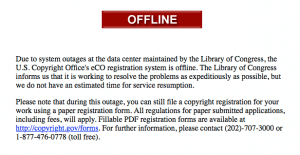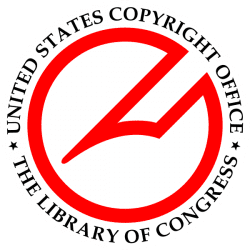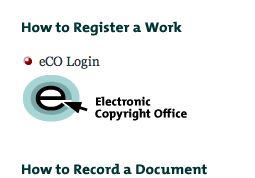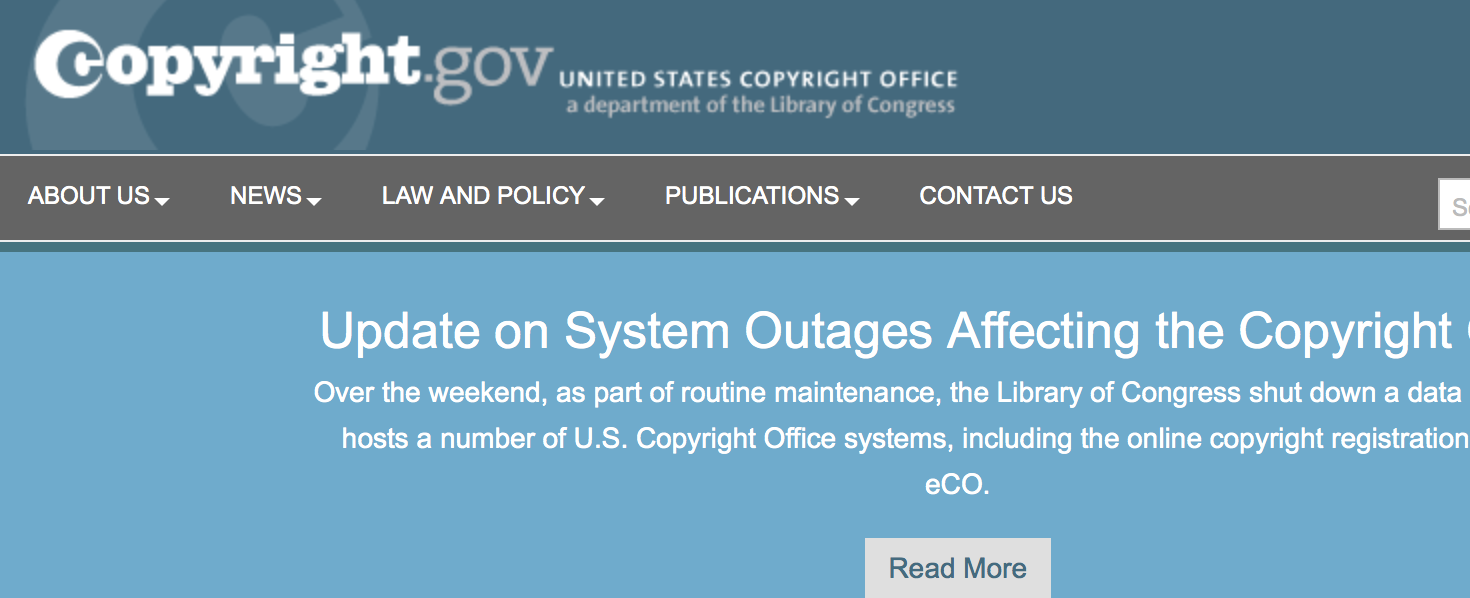The U.S. Copyright Office Fails Again, eCO Offline
 I’m writing this post on the morning of September 3rd, 2015. Right now. If you visit the U.S. Copyright Office’s (USCO) Electronic Copyright Office (eCO) system, you’re greeted with the error at the left.
I’m writing this post on the morning of September 3rd, 2015. Right now. If you visit the U.S. Copyright Office’s (USCO) Electronic Copyright Office (eCO) system, you’re greeted with the error at the left.
While errors are a part of life online, the USCO took the system offline on August 29th and was unable to bring it back up. That makes this its fifth day of downtime and there is still no timetable for it to return.
While this would be a complete disaster for any Silicon Valley startup, the eCO system is an essential tool for content creators to protect their work and ensure they have all the rights and benefits that come with creating it.
The USCO’s solution, simply use paper forms, is not only a tone deaf solution to the problem, but more burdensome, with paper forms costing between $30-$50 more than an online registration and taking up to five months longer to process.
But that’s really just the tip of the iceberg when it comes to the USCO. It’s attempt to modernize and keep up to date with the needs of a digital world have almost all failed. Everything from its policies to its digital tools have been hurtful to online creators.
Though U.S. copyright law may make the the USCO a necessary evil, it doesn’t have to be that way. Other nations get by just fine without semi-mandatory registration and it’s time for the USCO to just admit that we would too.
For the USCO, their online charade has been down for five days and maybe, just maybe, it should stay down for good.
Why You Need the USCO
 To be clear, you do not need to register your work with the U.S. Copyright Office in order to enjoy copyright protection. Your creations are protected the moment they are fixed into a tangible medium of expression, meaning the minute they are saved, written or otherwise made permanent.
To be clear, you do not need to register your work with the U.S. Copyright Office in order to enjoy copyright protection. Your creations are protected the moment they are fixed into a tangible medium of expression, meaning the minute they are saved, written or otherwise made permanent.
However, that protection is largely symbolic without a copyright registration. That because a registration provides four key benefits:
- Establishes public record of the copyright claim that also serves as proof of ownership if filed timely.
- Required to file a copyright infringement lawsuit if the work is of U.S. origin.
- Timely registration enables the user to claim statutory and damages and attorneys fees.
- Allows the registrant to seek help from U.S. Customs Service to prevent importation of illegal copies.
For most copyright holders, the middle two are the most important. Without a copyright registration, a creator can not file a lawsuit and, without a timely one can not collect statutory damages or attorneys fees. This means that, with no registration a lawsuit is impossible and, without timely registration, that it’s is almost always impractical.
In short, while you have a copyright in a work just by creating it, you have no means of enforcing that copyright in a court without first registering it.
While this wasn’t a huge deal when copyright was largely an issue for major record labels, publishers, and movie studios, in 2015 the proliferation of the Internet has made us all content creators with significant personal and financial interests in our works.
Sadly, the U.S. Copyright Office’s attempts to keep up with the digital revolution have been, without exception, abysmal failures and five days of downtime is really just the latest in a long line of debacles.
A Long History of Failure
 The recent outage of the eCO system is certainly a very glaring failure, but the system itself has never been a shining success.
The recent outage of the eCO system is certainly a very glaring failure, but the system itself has never been a shining success.
Launched in 2008, it came far too late. Many, myself included, had been publishing online for more than a decade by the time the Copyright Office offered an online tool to the public.
Ridiculously expensive, costing millions of dollars and taking over three years to complete, the system was behind the times even when it launched, looking and behaving like a site from the 90s. Even today, the FAQs only say that it’s been confirmed to work with Firefox on Windows 7.
But that’s still better than how they began the project, when they insisted that the only way to use it would be in Internet Explorer on Windows. Fortunately, a public outcry killed those particular plans.
Once the system went online it promised to issue in a heyday of cheap and fast registrations but that didn’t come to be. Shortly after launch, wait times on new copyright registrations climbed to more than nine months. While they did briefly get a handle on their processing times, pushing it down to under a few months, the time now, according to the USCO is “up to 8 months”.
Cost improvements haven’t panned out either. The cost of a “simple” registration through the eCO system remains $35 but more complicated ones, such as those with more than one author or works for hire, have been raised to $55.
To make matters worse, the USCO’s own policies are compounding their technical failings. For example, recent rule changes now force bloggers to register every single post of their site separately. Plagiarism Today, for example, has an average of about 25 posts per month, meaning it would cost me $875 per month to register everything.
This pushes copyright registration beyond the reach of nearly all bloggers and actually hurts their efforts to collect data on behalf of the Library of Congress.
The result, to put it bluntly, is this: If you are a small to medium sized creator and a U.S. citizen, from a copyright-protection standpoint, you are a second-class citizen.
You can’t sue for copyright infringement, you don’t have a practical path to registration to obtain that right and a creator outside the U.S. has more rights in a U.S. court than you do in copyright matters. That because, without a registration because at least they can file a lawsuit, even if they can’t collect all of their damages.
The U.S. Copyright Office and its failings are actively harming U.S. creators, in particular smaller ones. It’s time to recognize that and end it.
It’s Time to Give Up
When it comes to copyright registration, the U.S. stands alone. Though some countries, such as Canada, have optional copyright registrations, they aren’t required to enforce your rights. Only the U.S. ties any enforcement rights to the registration of a work.
Even if the USCO worked flawlessly, which it clearly doesn’t, this move would still harm smaller creators, especially those either too poor to register their works or unaware of the need. Where record labels, movie studios and publishers can shoulder this burden with ease, it’s your average blogger, photographer, artist, YouTuber, etc. that suffers under this system.
And that’s the big problem. Copyright law in the U.S. is really a two-tier system. There are large creators who can trivially deal with the nuisance of the registration requirement and those that are fenced outside the legal process because of it. This might not have been a huge deal when the cultural landscape was dominated by those aforementioned large players, but the Web has democratized creation, smaller creators are more important than ever and deserve equal protection.
But even if the benefits of registration outweighed the drawbacks, they certainly don’t when the registration is a complete and utter failure. Which is what the eCO system is. With over ten years to work on the system, it’s just fallen more out of date, become less usable and far less reliable.
It’s time to move on and even the USCO should recognize that at this point.
Bottom Line
Just how bad are things at the USCO when it comes to information technology? The government itself is calling out the Copyright Office on it problems.
In a March 2015 report, the Government Accountability Office released a report simply entitled, “Copyright Office Needs to Develop Plans that Address Technical and Organizational Challenges” (PDF).
That report said, in part:
The [copyright] office does not have an IT strategic plan, and officials described difficulties in developing such a plan given that the Library [of Congress] has not yet developed one.
While the report lamented the quality of the USCO’s IT infrastructure, in particular the eCO system, it recommended not granting it the requested $7 million for improvements because neither the USCO or the Library of Congress, which the USCO is under, had a plan on how to use those funds or any sense of direction on the issue.
In short, the USCO is adrift. It doesn’t have the beginnings of a plan for improving its IT infrastructure and funds needed to improve it will most likely not be coming until it does. In the meantime, content creators can not afford to wait.
Even if the USCO were a smashing success, the registration system would be an undue burden on the most vulnerable content creators. However, as a failure, it’s a catastrophe to all creators.
For proof of that, all you need to do is attempt to log in to the eCO system and register a work…
Want to Reuse or Republish this Content?
If you want to feature this article in your site, classroom or elsewhere, just let us know! We usually grant permission within 24 hours.
